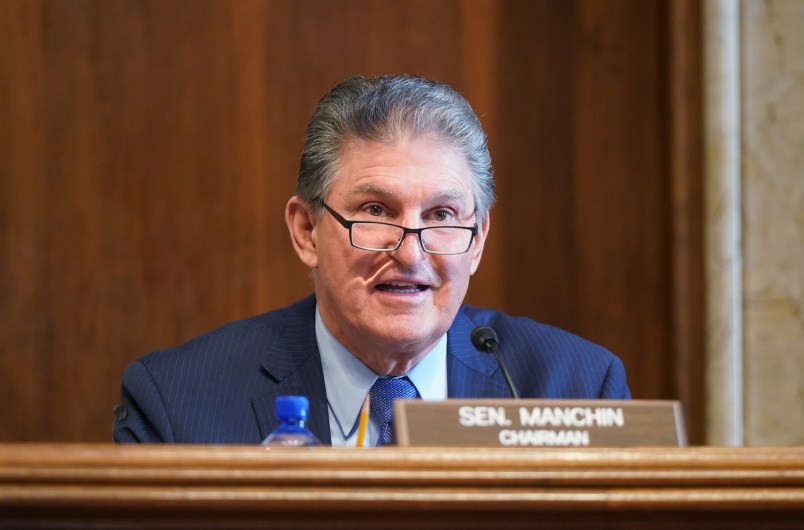Liberal Democrats are enraged at West Virginia Senator Joe Manchin for opposing the For the People Act and for supporting the filibuster, which would have to be overturned in order for the voting legislation, even with Manchin’s support, to get through Congress. Manchin may, however, be doing these liberal Democrats a favor in this case.
In response to setbacks in November 2020, Republican state governments are attempting to rig their election laws to favor their own candidates. Some of these measures, such as limiting voting by mail, may not favor Republicans at all. (Several of the measures counter rules that were specially designed for voting during the pandemic and may be irrelevant in 2022 and beyond.) Other measures, such as limiting polling places and times in urban areas, could depress minority voting and benefit Republicans. Still others, such as allowing state legislators to overturn popular election results, are probably unconstitutional.
The Democrats — and freedom-loving Republicans and independents — should primarily be concerned with the laws that discourage normal non-pandemic era voting; and a bill that directly targeted those measures would enjoy wide popular support and could even garner some Republican support in Congress. But the For the People Act (H.R. 1), which was passed by House of Representatives in March, is not such a bill. Instead, it is an 886-page Christmas tree of progressive election measures. I am not saying Manchin is right to oppose it. I would probably favor 90 percent of the provisions. But it’s very understandable that he does and that other Democrats, in addition to every Republican, would.
These measures include, as I have described before, wide-ranging campaign finance reform, including public funding of elections, the institution of non-partisan redistricting, support for Congress being able to declare the District of Columbia a state, and a panoply of regulations that would govern state elections — elections that are supposed to be the purview of states. Many of these provisions are controversial. In West Virginia, the Association of County Clerks sent Manchin and his fellow senator, Shelley Moore Capito, a letter opposing the bill on the grounds that West Virginia was not prepared to implement many of the new regulations. Of the 54 of 55 clerks who signed the letter, 37 were Democrats.
On MSNBC, Rachel Maddow unveiled a poll staged by “End Citizens United” that showed a majority of West Virginians in favor of the legislation. I have been unable to come up with a copy of the actual poll, but believe me, once the myriad and extraordinarily ambitious details of the legislation were unveiled — and they would be revealed during hearings and debate — voters’ reaction throughout the country would be mixed. The public has not been adequately prepared for the kind of sweeping electoral reform that this bill would attempt. And in this respect, Manchin’s opposition has been entirely understandable.
Democrats would be better off paring down their initiative to several measures that would be readily understandable and popular — making election-day a federal holiday, for instance. And they would be even better off, as Manchin suggested, putting their weight behind the John Lewis Voting Rights Advancement Act, which would restore the provisions of the Voting Rights Act struck down by the Supreme Court, and permit the Justice Department to block measures intended to curb minority voting. These measures are readily understandable, and would earn some Republican support, and they do address the Republican efforts to rig forthcoming elections. If this bill failed, that defeat could be used against Republican candidates in 2022 and 2024. It would portray the Republicans as captive of Trump’s bigotry and assault against democracy, and this measure’s defeat might also lead some Democrats to reconsider their opposition to filibuster reform.
As for the filibuster, the Democrats currently lack the popular support — as well as support in the Senate — for doing away entirely with the filibuster. To do that, Democrats would have to show that Republicans were using the filibuster to block measures that wildly popular. The For the People Act doesn’t qualify. Nor do the most of major bills that House Democrats have passed and are hoping to pass that cover gender, race, immigration, labor, and gun control. Democrats will have to bide their time with these measures and those that address campaign finance and redistricting. Does that mean that the first two years of the Biden administration will prove a failure? Maybe not, as intimated by the New York Times’ David Leonhardt in a column this morning about Manchin.
What Democrats can pass without the threat of the filibuster are spending and taxing measures. These can be passed through a process called reconciliation. These kind of economic measures, epitomized in the Biden administration’s relief and recovery bills, are popular. So, too, was the recent Senate bill promoting an industrial policy, which won bipartisan support. In other words, the presence of the filibuster forces Democrats in the Senate and the Biden administration to focus their efforts on popular economic measures. These measures will put the party in good stead in the next elections, which Democrats must win if they don’t want whatever they accomplish in these years to be reversed or subverted. If the Democrats lose the Congress in 2022, they will be stymied.
By the same token, the presence of the filibuster makes it more difficult for Democrats to pass controversial measures — especially those that might provoke cultural divisions over gender, guns, abortion, and immigration — that could benefit Republicans in states like Arizona, Georgia, Pennsylvania, Wisconsin, North Carolina, Ohio, and New Hampshire where in 2022, Democrats either have a chance either of winning Senate seats or where they must withstand Republican efforts to defeat Democratic incumbents. In that respect, Manchin may be doing the Democrats a favor by his stand against the For the People Act and ending the filibuster.


